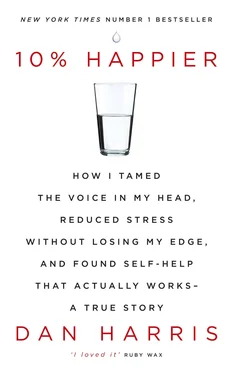“That’s the same thing,” he said.
Up on that stage in the Hilton ballroom, Mark had disliked what Brach was saying. Instead of mindlessly criticizing her, though, he calmly and tactfully disagreed. Seeing a problem clearly does not prevent you from taking action, he explained. Acceptance is not passivity. Sometimes we are justifiably displeased. What mindfulness does is create some space in your head so you can, as the Buddhists say, “respond” rather than simply “react.” In the Buddhist view, you can’t control what comes up in your head; it all arises out of a mysterious void. We spend a lot of time judging ourselves harshly for feelings that we had no role in summoning. The only thing you can control is how you handle it.
Bingo: respond not react. This, it struck me, was the whole ball of wax. This was why, as I’d recently learned, so many surprising people had become meditators. Basketball coach Phil Jackson, Supreme Court Justice Stephen Breyer, Ford CEO Bill Ford, Weezer frontman Rivers Cuomo. Even the rapper 50 Cent. Even Tom Bergeron. A successful dotcom friend of mine said that once he started meditating he noticed he was always the calmest person in the room during heated meetings. He called it a “superpower.”
Mark said this had a direct bearing on my ongoing work situation. “Sitting with your feelings won’t always solve your problems or make your feelings go away,” he said, “but it can make you stop acting blindly. Maybe you won’t be sullen with your boss, for example.”
As I sipped my beer in the swank hotel bar with the shrink who I’d forced into doing bespoke guru work for me, I realized that the smart play in my current professional circumstances was to just sit tight. I had made my case; the only thing I could do now was put my head down, work hard, and hope for the best. In other words: respond—don’t react.
Mark also pointed out that mindfulness was a skill—one that would improve as I got more meditation hours under my belt. In that spirit, he said I should consider going on a retreat. The type of thing Mark was talking about was much more demanding than the Buddhist seminar with Tara Brach. He was recommending a silent, ten-day slog, where I would be cloistered at a Buddhist retreat center with dozens of other meditators. No talking, no television, no beer—just meditation, all day. When I indicated that I would rather lie down in traffic, he reassured me, saying it would be hard but worth it. Specifically, he recommended that I sign up for a retreat led by someone named Joseph Goldstein, who Mark referred to as “his” meditation teacher. He spoke about this Goldstein character in the most glowing of terms, which intrigued me. I figured if a guy I revered revered another guy, I should probably check that other guy out.
As we were paying the bill, I said, “If you’re up for it, I’d love to get together every month or two.”
“Sure,” he said, looking up from the remains of his drink and meeting my gaze. With uncontrived sincerity he said, “I want to know you.” That was one of the nicest things anyone had ever said to me. After we’d finished, as we said good-bye, he gave me a hug. It was touching, and I appreciated his willingness to be my friend, but there was no way in hell I was going on a retreat.
Then Deepak reentered the scene. Via an aggressive email and text campaign, he had convinced me and the executives at Nightline to produce another Face-Off. This time, the debate would be between Chopra and his longtime nemesis, Michael Shermer, a former fundamentalist Christian turned militant atheist and professional debunker of pseudoscience. Shermer was the one who, as the head of the Skeptics Society, had decided to plaster Deepak on the cover of Skeptic magazine several years prior, with the headline “Doctor Woo Woo.”
The subject of the debate was whether God and science were compatible, which would be an interesting twist on the usual is-there-a-God debate, since Deepak didn’t believe in what he called the “dead white man” God of the Bible, but rather in an indescribable intelligence at the heart of the universe, a view he believed science could support. In true Nightline fashion, we gave the event an understated title: “Does God Have a Future?”
One of the first people I ran into when I got to the debate site—an auditorium at the California Institute of Technology in Pasadena—was Sam Harris, who’d published a pair of acerbic, bestselling anti-religion books, making him one of the heroes of a budding atheist movement. We had actually met back in 2007, when I was shooting a story at the American Atheists convention in Washington, D.C. His writings were so controversial that he lived in an undisclosed location and often traveled with security. I had a visual memory of interviewing him amid vendors of bumper stickers with slogans like JESUS, SAVE ME FROM YOUR FOLLOWERS. I recalled liking the guy; he was much more pleasant than his prose would have suggested.
He was here now, backstage in this auditorium, because Michael Shermer had chosen Sam as his debating partner. (Deepak had chosen a religious scholar named Jean Houston, perhaps best known for helping then first lady Hillary Clinton commune with the spirit of Eleanor Roosevelt.) My positive impression from that first encounter was quickly reaffirmed. Sam and I had the immediate rapport that two semi-Semites with the same last name are bound to have. With his close-cropped Jewfro and a face with just a touch of the shtetl, he reminded me a little bit of my brother. His affect was crisp and serious, but affable. He was dressed in a dark suit and nicely pressed blue shirt. His elegant and clearly very bright wife, Annaka, was with him. As the three of us chatted in Sam’s narrow little dressing room, it somehow came up that I was interested in meditation. They both perked up, then admitted that they were, too.
This I wasn’t expecting. It turned out that Mr. Atheist had a whole groovy past. As an undergrad at Stanford, Sam had experimented with ecstasy and LSD, had his mind blown, dropped out, and then spent eleven years traveling back and forth between the United States and Asia, where he lived in monasteries and ashrams, studying with various meditation teachers. During that time, he accumulated an aggregate total of roughly two years on silent retreats, meditating for twelve to eighteen hours a day. (Annaka, too, had years of meditation experience, and even worked as a volunteer teaching mindfulness to kids.)
Sam had never tried to hide this part of his past. In fact, as he reminded me, just moments after I had interviewed him at that convention back in 2007 he delivered a controversial speech in which he told the assembled atheists that denying the potential of “spiritual” experiences (he put the word in quotes, arguing it was an embarrassing term, but there were no real alternatives) made them just as ignorant as people who believed in Jesus. “It was the only time I’ve ever given a speech,” he said, “that started with a standing ovation and ended with boos.”
Sam truly did not mind pissing people off, though—and that rhetorical bloodlust was on full display at the debate. The hall was packed with partisans from both camps, a thousand people in all. Deepak’s opening statement was a vintage Choprian word salad. It included lines like this: “Today, science tells us that the essential nature of reality is nonlocal correlation.” As he spoke, our cameras captured Shermer and Harris rolling their eyes. Deepak wrapped up by calling the people at Caltech the “jihadists and Vatican of conservative and orthodox science.”
To which Sam responded, “I would never be tempted to lecture a room full of a thousand people at Caltech about physics. I’m not a physicist, you’re not a physicist—and basically every sentence you have uttered demonstrates that.” The crowd roared in approval.
Читать дальше












